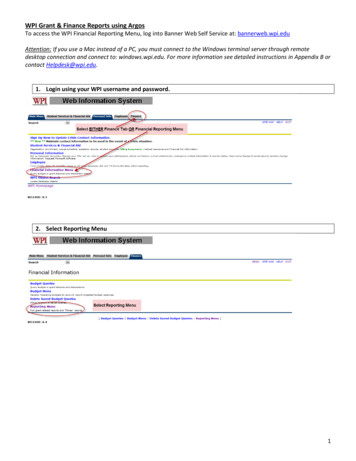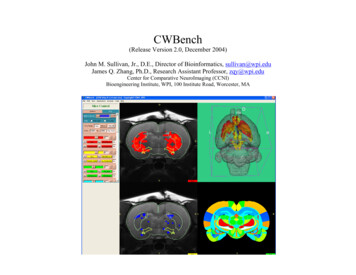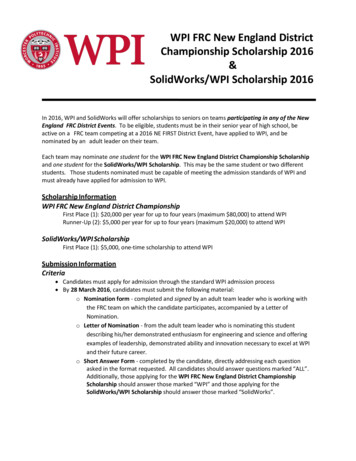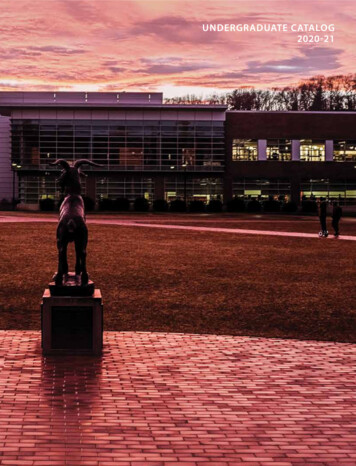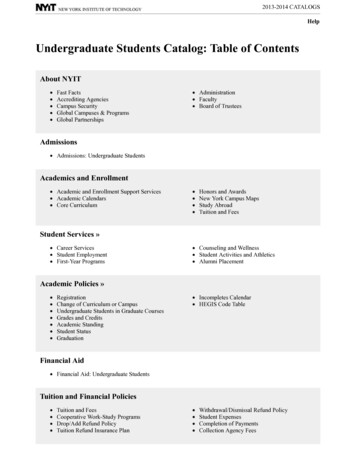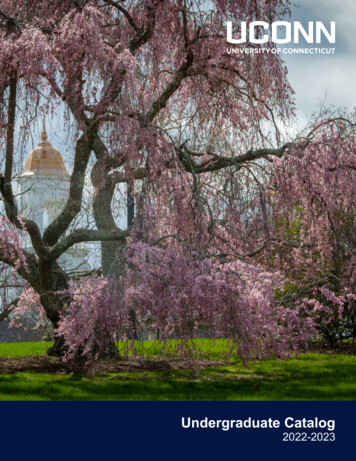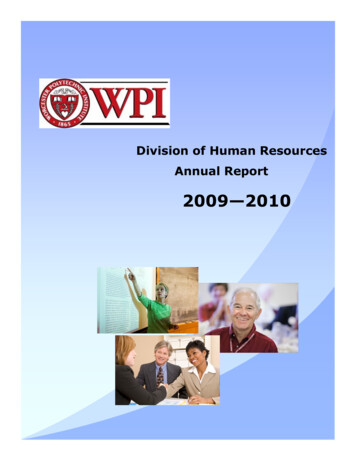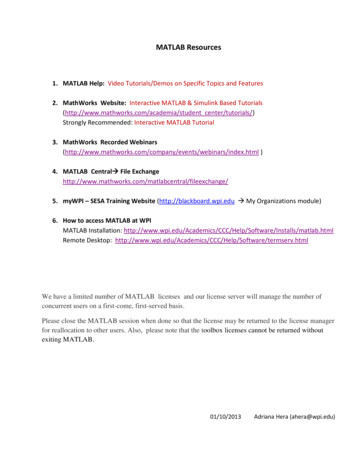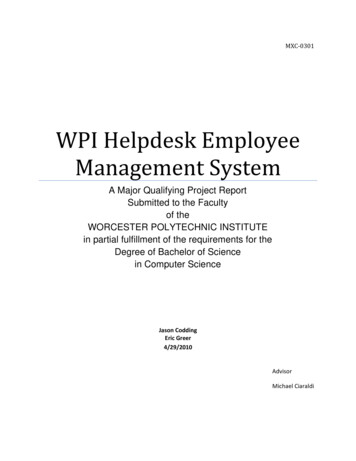
Transcription
WPI 2021-22 Undergraduate Catalog
Table of ContentsUndergraduate Catalog 2021-22 Page 4About WPI Page 4The Mission of WPI Page 4The Goal of WPI Page 4A Statement of Values for Undergraduate Education at WPI Page 4WPI Undergraduate Learning Outcomes Page 5WPI’s Commitment to Pluralism Page 5The Two Towers Tradition: The Second Century Page 5The WPI Plan Page 6Policies & Practices Page 6Currency of Information Page 7Accreditation Page 7Directions Page 8Academic Policies Page 8WPI Degree Requirements Page 8Professionally Accredited Programs Page 9Academic Advising Page 10Degree Options Page 10Projects and Research Page 13The Major Qualifying Project Page 16The Interactive Qualifying Project Page 17Global Projects Program Page 18Individually Sponsored Residential Projects (ISRPs) Page 19Individually Sponsored On-Campus IQP Programs Page 19Humanities and Arts Requirement Page 19The Social Science Requirement Page 26Courses Qualifying for Engineering Distribution Areas Page 27About Course Descriptions Page 27Off-Campus Programs Page 28University Policies and Procedures Page 28Grading Policies Page 28Transfer Credits Page 32Graduation with Honors Page 33Commencement Policy Page 33Early Completion Page 34Designation of Major Area of Study Page 34Double Major Page 34Designation of Class Year Page 34Academic Honesty Policy Page 34Guidelines for the Determination of Satisfactory Academic Progress,Academic Warning, Academic Probation and Academic Suspension Page36Administrative Obligations and Holds Page 38Directory Information and Release of Information Page 38Office of the Registrar Page 38Registration Page 38Records and Audits Page 39Graduation Page 39Projects Page 40Independent Study Page 41Official Withdrawal or Leave of Absence Page 41Return from Leave of Absence Page 42Part-Time Degree Students Page 42Non-Degree Students Page 43Resources and Special Programs Page 43The Gateway Park Page 43Special Programs for First Year Students Page 43Graduate Courses Page 44Combined Bachelor/Master’s Program Page 442Information Technology Services Page 45Music and Theatre Facilities Page 46George C. Gordon Library Page 47Student Services Page 48Student Exchanges Page 49HECCMA Course Cross-Registration Page 50Cooperative Education Page 51Summer Session (Term E) Page 53Awards and Prizes Page 53Societies, Registration and Licensing Page 57Career Development and Graduate School Page 58Career Development Center Page 58Graduate Study at WPI Page 59Admissions, Expenses, Financial Aid, and Housing Page 64Admission to WPI Page 64Expenses Page 68Financial Aid Page 70Housing Page 74Trustees, Administration, and Faculty Page 76Trustees Page 76Administration Page 79Faculty Page 81Degrees Page 109Aerospace Engineering Page 109Air Force Aerospace Studies Page 113Architectural Engineering Page 114Bioinformatics and Computational Biology Page 116Biology and Biotechnology Page 118Biomedical Engineering Page 121Business Page 126Chemical Engineering Page 134Chemistry and Biochemistry Page 138Civil and Environmental Engineering Page 142Computer Science Page 146Data Science Page 149Electrical and Computer Engineering Page 153Environmental Engineering Page 158Fire Protection Engineering Page 159Humanities & Arts Page 160International and Global Studies Page 177Interactive Media & Game Development Page 179Interdisciplinary Page 184Liberal Arts and Engineering Page 189Manufacturing Engineering Page 191Materials Engineering Page 191Mathematical Sciences Page 193Mechanical Engineering Page 198Military Science Page 203Physical Education Page 204Physics Page 204Pre-Professional Programs Page 209Robotics Engineering Page 210Social Science and Policy Studies Page 212Economics Page 215International Development, Environment and Sustainability Page 217Psychology Page 219Society/Technology Studies Page 222Course Descriptions Page 224WPI 2021-22 Catalog
Aerospace Engineering Page 224Air Force Aerospace Studies Page 227Architectural Engineering Page 230Bioinformatics and Computational Biology Page 233Biology and Biotechnology Page 236Biomedical Engineering Page 249Business Page 258Accounting Page 259Entrepreneurship Page 260Finance Page 261Management Information Systems Page 262Marketing Page 263Operations and Industrial Engineering Page 263Organizational Behavior and Change Page 266Chemical Engineering Page 266Chemistry and Biochemistry Page 272Civil and Environmental Engineering Page 280Computer Science Page 287Data Science Page 297Electrical and Computer Engineering Page 299Engineering Science Interdisciplinary Page 308Fire Protection Engineering Page 312Geosciences Page 313Humanities & Arts Page 313Arabic Page 317Art History/Architecture Page 319Chinese Page 325English Page 327English for International Students Page 3323German Page 333History Page 334International and Global Studies Page 341Music Page 343Philosophy Page 348Religion Page 353Spanish Page 356Theatre Page 361Writing (WR) and Rhetoric (RH) Page 363Interactive Media & Game Development Page 367Interdisciplinary Page 377Mathematical Sciences Page 382Mechanical Engineering Page 394Military Science Page 403Nuclear Science Engineering Page 406Physical Education Page 406Physics Page 408Robotics Engineering Page 413Social Science and Policy Studies Page 416Development Page 421Economics Page 422Political Science, Government and Law Page 425Psychology Page 431System Dynamics Page 438Sociology Page 439General Social Science Page 440Society/Technology Studies Page 440WPI 2021-22 Catalog
Undergraduate Catalog2021-22About WPIThe Mission of WPIWPI educates talented men and women in engineering,science, management, and humanities in preparation forcareers of professional practice, civic contribution, andleadership, facilitated by active lifelong learning. Thiseducational process is true to the founders’ directive tocreate, to discover, and to convey knowledge at thefrontiers of academic inquiry for the betterment of society.Knowledge is created and discovered in the scholarlyactivities of faculty and students ranging acrosseducational methodology, professional practice, and basicresearch. Knowledge is conveyed through scholarlypublication and instruction.Adopted by the Board of Trustees, May 22, 1987The Goal of WPIWPI was founded in 1865 to create and convey the latestscience and engineering knowledge in ways that would bemost useful to the society from which its students came.Since that time, the disciplines of human inquiry haveexpanded extraordinarily, as have WPI’s constituencies. TheWPI curriculum, accordingly, has been reshaped numeroustimes, but it has remained true to its original mission offusing academic inquiry with social needs, of blendingabstraction with immediacy, of linking new knowledge toapplications.The goals of the undergraduate program are to leadstudents to develop an excellent grasp of fundamentalconcepts in their principal areas of study; to lay afoundation for life-long renewal of knowledge; to gain amature understanding of themselves; and, mostimportantly, to form a deep appreciation of theinterrelationships among basic knowledge, technologicaladvance, and human need. These principles are todaymanifest in the WPI Plan, a unique, project-orientedprogram which emphasizes intensive learning experiencesand direct application of knowledge. WPI remainscommitted to continued educational improvement andinnovation.The goals of WPI’s programs of graduate instruction andresearch are to create and convey knowledge at thefrontiers of academic inquiry. These endeavors are foundedon the principle that vigorously pursued and rigorously4assessed scholarship is the lifeblood of the institution. Highquality graduate instruction conveys the arts of scholarshipto new generations, and it assists working professionals inmaintaining currency in a world where knowledgebecomes obsolete with ever-increasing rapidity.A WPI education encompasses continuous striving forexcellence coupled with an examination of the contexts oflearning so that knowledge is won not only for its own sakebut also for the sake of the human community of which thepeople of WPI are part.Endorsed by the WPI Faculty on March 5, 1987, and by theBoard of Trustees on October 16, 1987.A Statement of Values forUndergraduate Education at WPI1. WPI’s programs shall emphasize fundamentalconcepts, knowledge, and skill, and ensure thatstudents are able to apply them within the context oftheir major disciplines.2. WPI’s programs shall emphasize the development ofstudents as effective thinkers and communicators,able to use evidence to present their ideas with logic,clarity, and persuasion.3. Programmatic breadth in general, and balancebetween technical and humanistic components inparticular, are the hallmarks of a WPI undergraduateeducation. In addition to educating students in theirmajor discipline, WPI’s programs shall providestudents with a broad preparation for fulfilling lives asresponsible professionals and informed citizens.4. Grounded in project and course experiences, a WPIeducation shall provide a firm foundation for life-longlearning in a variety of fields. WPI programs shallemphasize inquiry-based learning and open-endedproblem solving. Students shall bear a considerableresponsibility for learning outside of the classroom.5. WPI’s programs shall be sufficiently flexible so as toallow students significant choice in and responsibilityfor planning their courses of study. Faculty, via thecentral teaching tasks of project and academicadvising, shall ensure that student learningexperiences encourage critical reflection, decisionmaking, and personal growth.6. WPI’s programs shall emphasize the scientific,technical, societal, and humanistic contexts in whichknowledge is applied and constructed. Educationactivities shall challenge students to makeconnections between disciplines, to consider multipleviewpoints, and to appreciate the consequences oftheir actions. The curriculum shall prominentlyfeature integrative and interdisciplinary activities.WPI 2021-22 Catalog
7. WPI’s learning environment and educational activitiesshall balance personal responsibility and individualaccountability with cooperation, collaboration andmutual respect. Members of the community shall beencouraged to value academic integrity, and tobecome conscious of the value that such integrityconfers to themselves and to the community.8. WPI shall be committed to assessment andimprovement of student learning.proclaims the importance of having students understandand appreciate other cultures, and prepares them fully topursue rewarding careers in an increasingly globaleconomy.WPI Undergraduate LearningOutcomesGraduates of WPI will:1. have a base of knowledge in mathematics, science,and humanistic studies.2. have mastered fundamental concepts and methodsin their principal areas of study.3. understand and employ current technological tools.4. be effective in oral, written and visualcommunication.5. function effectively both individually and on teams.6. be able to identify, analyze, and solve problems creatively through sustained critical investigation.7. be able to make connections between disciplines andto integrate information from multiple sources.8. demonstrate global and intercultural competency bydeveloping the capacity to identify, explain, andcritically analyze the forces (such as cultural,historical, political, economic) that shape the self andothers as they engage with local and globalcommunities.9. be aware of personal, societal, and professional ethical standards.10. have the skills, diligence, and commitment toexcellence needed to engage in lifelong learning.WPI’s Commitment to PluralismPluralism, as a social condition, means that several distinctethnic, religious, and racial communities live side by side,have equitable access to resources, are willing to affirmeach other’s dignity, are ready to benefit from each other’sexperiences, and are quick to acknowledge each other’scontributions to the common welfare. Recognizing theimportance of pluralism to creativity, innovation, andexcellence, WPI is dedicated to creating an atmospherethat encourages diversity in all aspects of campus life–fromacademics, to residence hall living, to social interactionsamong students, faculty, and staff. The Institute recognizesthe special obligation of promoting a multiculturalcommunity based on mutual respect and tolerance. Thiscommitment is part of WPI’s institutional plan forencouraging pluralism and increasing diversity, a plan that5The Two Towers Tradition: TheSecond CenturyWPI, the nation’s third oldest private technologicaluniversity, was established in 1865 by the New Englandindustrialists John Boynton, Ichabod Washburn, and theirassociates. Boynton and Washburn endowed the first twobuildings on campus, as academic classrooms and practicalshops. Boynton Hall and the Washburn Shops — renovatedtoday into state-of-the-art facilities — still preserve theirdistinctive original towers. These “Two Towers” representWPI’s continued commitment to academic excellencethrough real-life project experience that synthesizesclassroom learning.The “Two Towers” tradition of academic achievement andpractical application is reflected in WPI’s motto, “Lehr undKunst” or “Theory and Practice.”WPI has awarded graduate degrees since 1898, adding newprograms regularly in response to the developing needs ofthe professional world. WPI is among the top 50 sciencecolleges in the nation in terms of the percentage ofundergraduates who receive doctorates. Presently, WPIoffers the master’s degree in 31 disciplines and thedoctorate in 15.The current student body of over 4,000 men and womenincludes about 1,100 full- and part-time graduate students.Currently, students attend WPI from almost every state andover 70 foreign nations.WPI 2021-22 Catalog
Policies & PracticesNotice of Nondiscriminatory Policy as toStudentsIt is the policy of Worcester Polytechnic Institute that eachqualified individual, regardless of race, color, sex, religion,sexual orientation, national origin, age as defined by law, orhandicap, shall have equal opportunity in education,employment or services of Worcester Polytechnic Institute.It is the policy of WPI to follow U.S. federal governmenteligibility guidelines in the administration of itsinstitutional financial aid program.Student Responsibilities for Ethical andProfessional ConductThe WPI PlanIn 1970 WPI adopted a revolutionary new undergraduateprogram known as the WPI Plan. The Plan replaced thetraditional rigidly-prescribed curriculum — typical ofconventional engineering education — with a flexible,exciting, and academically challenging program aimed athelping students to learn how to learn. The Plan continuesthe “Two Tower” tradition by synthesizing classroomexperience in projects that solve realworld problems. TheWPI project program prepares graduates for their futureprofessional lives by helping them learn how to identify,investigate and report on open-ended problems. Alumniindicate that project experiences also prepare themuniquely well for managing team efforts, and forcommunicating both in oral and written forms accordingto professional standards.All WPI students complete two major projects in additionto requirements in general education and in their majorfields. The Major Qualifying Project (or MQP) challengesstudents to solve research and design problems typical ofthose encountered in their professional discipline. TheInteractive Qualifying Project (or IQP) presents an issue atthe intersection of science, technology, and culture, and emphasizes the need to learn about how technology affects societal values and structures. Students also achieveintellectual breadth through degree requirements in thesocial sciences and humanities and arts. In addition,students achieve some depth within the Humanities andArts by completing an Inquiry Seminar or Practicum on atheme emerging from a self-selected series of courses.Taken together, these activities emphasize thatprofessionals must learn not only to create technology, butalso to assess and manage the social and humanconsequences of that technology.6WPI expects all its students to demonstrate the highestsense of honor in respecting academic and professionaltraditions such as acknowledging the borrowing or use ofother people’s ideas. Willful violations (like plagiarism) ofsuch academic traditions or of legal restrictions (like thoseregarding copyright) will be considered violations of the“Campus Code” as described in the Student Planner.WPI education is strongly committed to project-basedlearning, to providing students with access to state-of-theart technology, and to working with professionals, on andoff campus. Therefore, when students are exposed toproprietarial and/or confidential information, they mustaccept responsibilities appropriate to their preparation forlife-long careers in which codes of ethics governprofessional conduct.Facilities such as the off-campus projects, employmentsites, and on-campus laboratories permit students to gainexperience with techniques at the forefront of industrialand research development. With this access comes theadded responsibility of safeguarding students of anyagreements they sign regarding conditions or restrictionsfor access to certain equipment or information will also beconsidered a violation of the “Campus Code” as describedin the Student Planner.Record of any penalties assigned by the WPI CampusJudicial System which result from violation of standards ofethical conduct will become a permanent part of thatstudent’s disciplinary record.Student Absence Due to ReligiousBeliefsSection 2B, Chapter 151C of the General Laws of theCommonwealth of Massachusetts: “Any student in aneducational or vocational training institution, other than areligious or denominational educational or vocationalWPI 2021-22 Catalog
training institution, who is unable, because of his/herreligious beliefs, to attend classes or to participate in anyexamination, study, or work requirement on a particularday shall be excused from any such examination or studyor work requirement, and shall be provided with anopportunity to make up such examination, study, or workrequirement which he/she may have missed because ofsuch absence on any particular day; provided, however,that such makeup examination or work shall not create anunreasonable burden upon such school. No fees or anykind shall be charged by the institution for makingavailable to the said student such opportunity. No adverseor prejudicial effects shall result to any students because ofhis/her availing himself/herself of the provisions of thissection.”Policy for Institutional Charges andRefunds for Students Called to MilitaryActionWPI recognizes the obligations of our students who arecalled to active duty by the U.S. Military. To support thesestudents WPI has established this policy to facilitate theirtransition from, and back to active student status.Such students shall receive 100% refund for theuncompleted term(s) of the semester at the date of thenotice. If such student has a loan obligation to WPI they willbe granted an in-school deferment status during theperiod of active duty service, not to exceed a total of threeyears.To initiate the process to be classified “On leave for militaryservice” the student must indicate, in writing, that he/she isrequesting school deferment status while being called toactive duty. A copy of the official call to active duty noticefrom the military must be included with this request andbe submitted to the Registrar’s Office.Currency of InformationThe information contained in this Undergraduate Catalog isnot a complete statement of all the policies, practices, rulesand regulations of Worcester Polytechnic Institute. Anystatement made in this publication is for currentinformational purposes only and is subject to change bythe governing body of WPI or its duly authorizedrepresentatives. Certain policies, rules and regulations arenot published in this publication but are promulgateddirectly by the appropriate department. Members of theWPI community are expected to abide by the currentpolicies, practices, rules and regulations of the college,even though they may not be contained in this publication7or may not be consistent with the information contained inthis publication, whether due to a properly authorizedchange or to a printing error.Changes, deletions, and additions authorized by thegoverning body of WPI, after the printing of this catalog,are posted on WPI’s web page at www.wpi.edu/ as asupplement to the undergraduate catalog, and includesthe effective date of the action.AccreditationWorcester Polytechnic Institute is accredited by the NewEngland Commission of Higher Education (formerly theCommission on Institutions of Higher Education of the NewEngland Association of Schools and Colleges, Inc.).Accreditation of an institution of higher education by theCommission indicates that it meets or exceeds criteria forthe assessment of institutional quality periodically appliedthough a peer review process. An accredited college oruniversity is one which has available the necessaryresources to achieve its stated purposes throughappropriate educational programs, is substantially doingso, and gives reasonable evidence that it will continue todo so in the foreseeable future. Institutional integrity is alsoaddressed through accreditation.Accreditation by the Commission is not partial but appliesto the institution as a whole. As such, it is not a guaranteeof every course or program offered, or the competence ofindividual graduates. Rather, it provides reasonableassurance about the quality of opportunities available tostudents who attend the institution.Inquiries regarding the accreditation status by theCommission should be directed to the administrative staffof the institution (gr-Accreditation@wpi.edu).The aerospace engineering, architectural engineering,biomedical engineering, chemical engineering, civilengineering, electrical and computer engineering,environmental engineering, industrial engineering, andmechanical engineering programs are accredited by theEngineering Accreditation Commission of ABET,http://www.abet.orgThe Chemistry and Biochemistry Department and itsprogram at WPI are approved by the American ChemicalSociety for a major in chemistry or biochemistry. Thosechemistry majors who complete a program satisfying theguidelines established by the American Chemical Societyare certified to that organization as having received anundergraduate professional education in chemistry orbiochemistry.WPI 2021-22 Catalog
The undergraduate and graduate business offerings inThe Business School are accredited by AACSB International,the Association to Advance Collegiate Schools of Business.AACSB International is a not-for-profit organizationconsisting of more than 900 educational organizations andcorporations. Its mission is excellence in managementeducation in colleges and universities. Headquartered inTampa, Florida, AACSB International is the premieraccrediting agency and service organization for businessschools.DirectionsDriving to WPIFrom the East:Take Mass. Turnpike (I-90) to Exit 11A (I-495). Proceed northto I-290, then west into Worcester. Take Exit 18, turn right atend of ramp, then an immediate right before next trafficlight. At next light, proceed straight through, bearing tothe right on Salisbury St. At the WPI sign, turn left ontoBoynton St., then right onto Institute Rd., then right ontoWest St. Visitor parking is on the left after footbridge.From the North:Take I-495 south to I-290. Follow directions as from east.From the South and West:Take Mass. Turnpike (I-90) to Exit 10 (Auburn). Proceed easton I-290 into Worcester. Take Exit 17, turn left at end oframp, follow Rte. 9 west through Lincoln Sq., straight ontoHighland St., then right at light onto West St. and throughfirst intersection. Visitor parking is on the left afterfootbridge.Academic PoliciesWPI Degree RequirementsWPI Degree Requirements(effective for students matriculating after August 1, 2011)WPI’s academic requirements are specifically designed todevelop an overall educational experience which meetsthe goals of the college. Each requirement plays asupporting role as follows: To provide intellectual breadth and a betterunderstanding of themselves and the diversity andcreativity of human experience, every WPI studentmust complete a Humanities and Arts Requirement;8 To provide an understanding of the priorities of othersectors of society, develop the ability to communicateeffectively with disparate groups, organize and derivesolutions to complex problems, and gain anawareness of the interrelationships betweentechnology and people, every WPI student mustcomplete an Interactive Qualifying Project (IQP); To provide a capstone experience in the professionaldiscipline, to develop creativity, instill self-confidenceand enhance the ability to communicate ideas andsynthesize fundamental concepts, every studentmust complete a Major Qualifying Project (MQP); To provide for learning through an academic programwith fabric and course balance while encouragingindividual student choices within that framework,every student must fulfill Distribution Requirements.WPI Terms and Credit UnitsThe Bachelor degree from WPI normally is based upon aresidency at WPI of 16 terms. WPI operates on a systemwith four seven-week terms, two in the autumn semester(Terms A and B) and two in the spring semester (Terms Cand D). A summer session, Term E, is also available. Thenormal academic load for each term is defined as one unitof work, usually divided among three courses or projects.Thus, the usual credit unit for courses or independentstudy/projects is 1/3 unit. Qualifying Projects, defined onpages 14-16, require one full unit of activity which may beconcentrated into a single term (especially if conductedoff-campus) or spread throughout an academic year. Thedegree will be awarded upon completion of the following:DEGREE REQUIREMENTS:1. The Humanities and Arts RequirementQualification by overall evaluation of two units ofwork in the humanities and arts. To provide intellectual breadth and a betterunderstanding of themselves and the diversityand creativity of human experience, every WPIstudent must complete a Humanities and ArtsRequirement.2. The Mathematics and Science Requirement(See distribution requirements for individualprograms) The Mathematics and Science Requirementdefines a minimum standard of scientific,technological, engineering, and mathematicalliteracy for graduates of WPI, regardless of majorfield. Most degree programs will provide asubstantial level of preparation in most of theseareas, far beyond this standard. Students willWPI 2021-22 Catalog
satisfy this requirement by satisfying theprogram requirements of their individual majorprograms. The goals of the Mathematics and ScienceRequirement at WPI are that students will beable, in their careers and daily lives, to: 1)explain and apply key concepts and principlesof scientific disciplines and use anunderstanding of scientific methods to makecritical judgments, 2) apply mathematicalmethods to understand the solution of realworld problems, 3) productively andappropriately use computers and othertechnology, 4) use methods from thequantitative, natural or engineering sciences tosystematically identify, formulate, and solveproblems. The specific requirement is two units of work inscience, engineering, mathematical science orcomputer science. Two-thirds units of workmust be in Quantitative Science; twothirds units of work must be in Natural orEngineering Science; the final two-thirds unitmay be from any of the Quantitative, Natural, orEngineering Sciences. Each major programmay decide which courses and/or prefixes countfor each category. Each major program mayset more restrictive requirements as theprogram sees fit.3. The Interactive Qualifying Project Successful completion of a qualifying projectrelating science and/or technology to society(the Interactive Qualifying Project, or IQP)representing at least one unit of credit in projector independent study work. The format of thedocumentation is to be in accordance withcurrent WPI policy on such documentation.4. The Major Qualifying Project Successful completion of a qualifying project inthe major area of study (the Major QualifyingProject, or MQP) representing at least one unitof credit in project or independent study work.The format of the documentation is to be inaccordance with current WPI policy on suchdocumentation.5. Distribution Requirements (See programdescription for specified departments) Satisfaction of published academic activitydistribution requirements in or relating to themajor area of study. These requirementstypically total no more than ten units (includingthe MQP and two units to fulfill theMathematics and Science Requirement) and arespecified by general topical subject area, not by96.7.8.9.specific courses. Completion of distributionrequirements will be certified by theappropriate Program Review Committee (PRC),upon recommendation by the student’sacademic advisor. For students desiringdesignation of a major area for which adetermination regarding distributionrequirements has not previously been madeand published, a faculty committee will beappointed by the department head or IGSDdean to review and approve the student’sprogram of study.Social Sciences Completion of 2/3 unit of work in the socialsciences, exclusive of qualifying project.Residency Requirement A minimum of eight units must be completedsatisfactorily in residence at WPI. (It
industrialists John Boynton, Ichabod Washburn, and their associates. Boynton and Washburn endowed the first two buildings on campus, as academic classrooms and practical shops. Boynton Hall and the Washburn Shops — renovated today into state-of-the-art facilities — still preserve their distinctive original towers. These "Two Towers .
